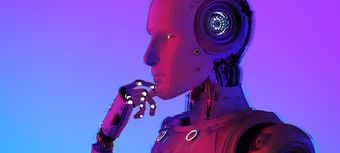Collaborating with robots: ethical and human challenges

Implemented by an increasing number of companies, artificial intelligence solutions raise ethical and social questions that are as yet largely unresolved. What challenges should you prepare yourself for?
What type of world should we foresee with the arrival of robots in our lives? A utopia finally come true or a scary mix of Terminator and of 1984’s Big Brother? The question seems less and less hypothetical as so-called intelligent robots are settling into our daily lives. In Mercedes factories, workers and cobots (robotized collaborators) assemble cars side by side. Our computers and our phones host virtual assistants such as Cortana or Siri. Uses are multiplying, be it to diagnose tumors or to rely on facial recognition systems to supervise the level of attention of students in class…
All these developments are made possible by the convergence of Big Data, progress in robotics and the increasing sophistication of algorithms. They also raise major ethical and social questions. Will the virtual assistants, supposed to ease our lives, become prying sneaks, on the lookout for our preferences, our opinions, all our actions and moves? Who would be held responsible in the event of an accident involving a self-driving car? Who would be accountable for a discriminatory decision based on a biased model? Recently, in the United States, a software from the Department of Justice thus denied parole to black inmates, on the basis that the statistical risk of subsequent offence was higher… Also, how can we avoid the dehumanization of work?
Leaders have a vested interest in addressing these questions now. Indeed, they will most probably surface as AI is integrated within their products or used to optimize their operations. Regulatory constraints, as well as public opinion pressure, have already started getting reinforced. Observers note an increase in customers’ and staff’s defiance towards the possible drifts of those tools. Which could eventually translate into a phenomenon of rejection, or even acts of sabotage?for example by feeding AI with fake information. We might as well anticipate?especially since focused research sheds a light today both on the issues to foresee and the first actions to envisage.
In this synopsis:
- Prepare the staff members for the arrival of artificial intelligence
- Anticipate the ethical and human challenges of artificial intelligence
- Artificial intelligence: what new competencies need developing?
SubscriberSign in
to download
the synopse (8 p.)
VisitorI want to buy
this synopsis (8 p.)
VisitorI want
to subscribe
See also

Artificial intelligence: beyond the buzz, a major challenge
Today, artificial intelligence offers huge potential, while raising as many hopes as fears. Indeed, while the gains are undeniable, implementation is not straightforward. What conditions are required to take advantage of AI?





